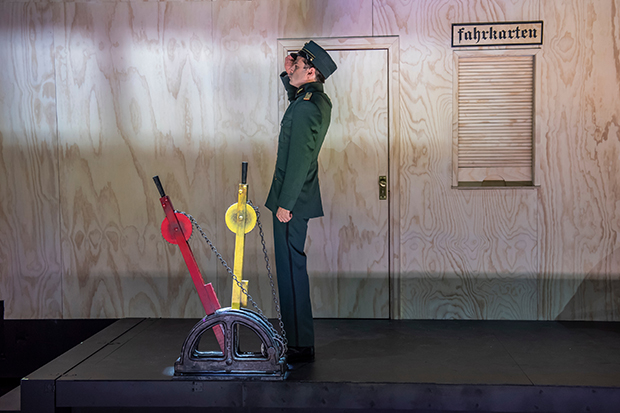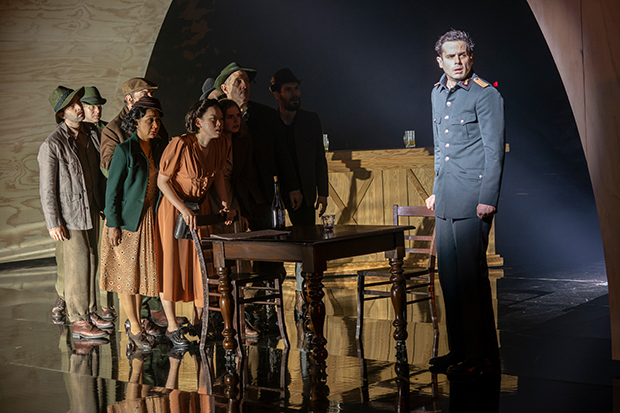A Life Derails in Judgment Day

(© Stephanie Berger)
"This is how rumors spread," the village gossip scolds a lumberjack in the first few moments of Ödön von Horváth's Judgment Day. And we instinctively know that this character will never admit to her culpability in crafting and disseminating those rumors. Such is the cold irony of Horváth's play, which has been given a new adaptation by Christopher Shinn and a jaw-dropping production by director Richard Jones. Even if you are turned off by the icy chill of the script, Jones's production draws you toward its bewitching flame.
The play tells the story of Thomas Hudetz (Luke Kirby), the stationmaster of a small train platform servicing a tiny village, likely in Austria (the gothic script of the word "Fahrkarten" over the ticket office gives it away). Thomas is expected to do everything at the station: sell the tickets, carry the luggage, and switch the signals. It hardly leaves room for a personal life, and the strain between him and his older wife (Alyssa Bresnahan) is the talk of the town. The innkeeper's daughter, Anna (Susannah Perkins), tries to seduce Thomas. As Frau Hudetz looks on from a high window, Anna leans in for a kiss. This causes Thomas to miss the signal for a passing express train, which soon after collides with a freight train. The blame game instantly begins.

(© Stephanie Berger)
Shinn has done a surprisingly excellent job of putting Horváth's words into contemporary English while maintaining the prewar tone of the piece (Horváth wrote the play in 1937, shortly before his untimely death at age 36). I half expected the characters to express themselves in the haltingly incomplete sentences of Shinn's plays Where Do We Live and Dying City. But unlike the timid New Yorkers inhabiting those plays, these no-nonsense Austrians have a tendency to say exactly what they mean. In a line that could be underlined with a red sharpie as Horváth's thesis, Thomas exclaims, "Who gives a sh*t about people?" It's a heavy-handed moment, but compared with the relentless ax-grinding of his contemporary Bertolt Brecht, this play is practically a choose-your-own-adventure.
Audiences looking for contemporary resonance in their theater will find plenty in Judgment Day. It can be taken as a warning against the MBA-driven economy, with individual workers asked to sacrifice their humanity to the god of productivity. It can serve as an indictment of the digital mob, in which participants rush to judgment in a frenzy of self-righteousness. It can also be seen from a feminist angle, since the mob instantly assigns malice to the truth-telling Frau Hudetz (although Anna's portrayal as a young siren argues against Horváth's placement in the feminist pantheon).
There's a lot to chew on in Judgment Day, and audiences who appreciate a subtler approach are likely to spit out this gristle in disgust. Jones makes complete rejection difficult, however, with a production that always presents some stunning new image or bone-shaking sound cue (sound by Drew Levy). Jones proved his talent for expressionist spectacle in The Hairy Ape, which played the Armory in 2017. This production is a worthy successor.

(© Stephanie Berger)
Paul Steinberg's set of moving plywood structures takes full advantage of the height of the Armory while also emphasizing the dreamlike qualities of this world (the blinding white drawers and uniform jars of the pharmacy particularly stick in my mind). Antony McDonald's period costumes place the story firmly in the 1930s. Mimi Jordan Sherin's lighting takes advantage of the cavernous depth of the drill hall (one scene impressively turns two actors into silhouettes). Daniel Kluger's jarring original brass music maintains tension during scene transitions. All of the designers collaborate to convey the awesome power of the passing trains. We can almost feel the wind whip by as the performers flinch away from the track.
The cast mostly pitches its performances to the back row, which feels over-the-top, but appropriate for this play. The one exception is Kirby, whose stony Thomas never emerges as a particularly endearing or even accessible protagonist. This gives us no one to root for, but it also gives us nowhere to hide, which I suspect is Horváth's intention.

(© Stephanie Berger)
In a standout performance, Harriet Harris is both hilarious and maddening as Frau Liemgruber, the Austrian equivalent of a Greek messenger. She vividly enacts the gospel of this town, relishing her performance no matter how often the narrative changes. And "the truth" as purveyed by Liemgruber does change, not that she or any of the other townspeople would ever own up to it. For them, being right is not a matter of facts, but numerical superiority.
And in that respect, she's not very different from people you might know. Judgment Day is a withering take on the tribal instinct, and the centrality of myth in reinforcing that instinct. When everyone in the room believes one thing, it is almost certainly not the truth.











